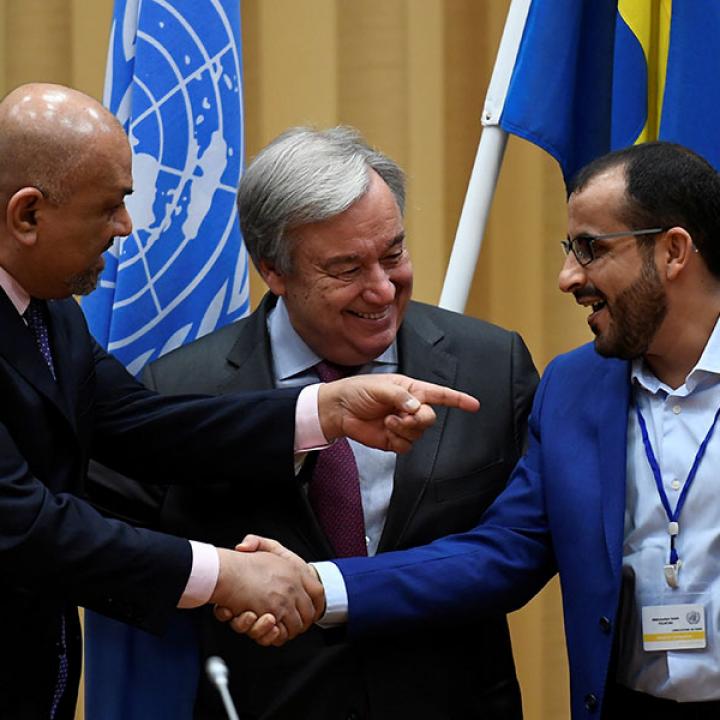
- Policy Analysis
- Policy Alert
How to Build on the New Yemen Agreement

Negotiations in Stockholm have created opportunities for progress, but pressuring the parties is necessary to cement these initial gains and keep the nascent process from collapsing.
Two significant Yemen-related events occurred today, both with implications for the next phase of the war. First, under the auspices of the UN Special Envoy for Yemen, the warring parties gathered in Stockholm and agreed to a ceasefire in the port city of Hodeida, the vital access point for humanitarian aid and commercial imports. Second, the U.S. Senate passed S.J.Res. 54, a joint resolution that seeks to end American military support for the Saudi-led coalition in Yemen.
On December 6, under the stewardship of Special Envoy Martin Griffiths, representatives from the internationally recognized Yemeni government and the Houthi rebel movement began a new round of negotiations. On December 13, leaders from the two delegations shook hands and agreed to (1) continue consultations early next year, (2) conduct a prisoner exchange, (3) implement a ceasefire at Hodeida, and (4) issue a statement of understanding on the city of Taizz.
In a laudable act of transparency, Griffiths posted the agreement online. While the very existence of direct negotiations and a written agreement is a remarkable milestone, an initial review of the documents reveals language that is notably opaque on several issues and subject to competing interpretations.
Indeed, reports suggest that the Houthis have already seized on the Hodeida agreement’s references to “local security forces” being responsible for security to insist that they should be in charge—a nonstarter for the Saudi coalition and the Yemeni government. This issue will need to clarified in order to prevent a breakdown of the entire accord.
The Hodeida agreement also calls for the removal of all forces from the city and port, with a “Redeployment Coordination Committee” overseeing the ceasefire, troop withdrawal, and port demining effort in yet-to-be-determined phases. The UN will play a “leading role” in the management and inspection of ports and will “strengthen” its presence to take on this greater mission. The agreement commits the parties to facilitate freedom of movement for civilians and goods to and from the port, as well as the delivery of humanitarian aid. Although mentioning the humanitarian prerogative is vital given the near-famine conditions in much of the country, it is worrisome that the parties are not called on to do more than “facilitate.”
As for the Senate resolution, Secretary of State Mike Pompeo and Defense Secretary Jim Mattis invested significant efforts in discouraging its passage over the past week, warning that it would derail negotiations in Sweden and embolden the Iranian-supported Houthis. They also pointed out that the administration had already ended military refueling support to the Saudi coalition last month. The resolution passed anyway, though it is unlikely to advance any further before the new year given other congressional priorities and the Trump administration’s opposition to the bill.
To the extent that actors on the ground pay attention to such debates in Washington, U.S. officials should use the Senate’s action as leverage, leaning on the Saudi coalition and Yemeni government to expedite the next round of talks. The uptick in congressional focus on the war also means that Griffiths and the administration have their work cut out for them in keeping all parties focused on implementing the new agreement and locking in the next round of talks in January.
Going forward, officials should concentrate on the following measures:
- Hold the parties accountable. In light of the fact that all previous ceasefire agreements in Yemen have collapsed, the international community should make sure that the Redeployment Coordination Committee is stood up expeditiously. The UN Security Council could reinforce the progress made in Sweden with its own endorsement.
- Clarify ambiguities. References in the Stockholm documents to local security forces, local state institutions, and the Central Bank of Yemen are all susceptible to misinterpretation and exploitation by the warring parties. Backers of the parties have all endorsed the agreement while adding their own spin (e.g., see responses from Emirati and Iranian officials). Griffiths should use his December 14 briefing to the Security Council to clarify his expectations, with Europe and Washington reinforcing his points and otherwise backing him up.
- Effectively resource and support the UN. It is unclear whether the UN has the staff and resources to quickly scale up its presence in Hodeida and other key ports. The U.S. government and other actors have already invested heavily in third-party monitoring efforts such as the UN Verification and Inspection Mechanism for Yemen, in part to address coalition concerns regarding illicit weapons smuggling into Hodeida. Now is the time for the international community to underscore its commitment to the ceasefire and the free flow of humanitarian and commercial goods through the port—recognizing that the best means of doing so lies in giving the UN what it needs to implement the Stockholm agreement and build on this progress.
Dana Stroul is a senior fellow in The Washington Institute’s Geduld Program on Arab Politics.



